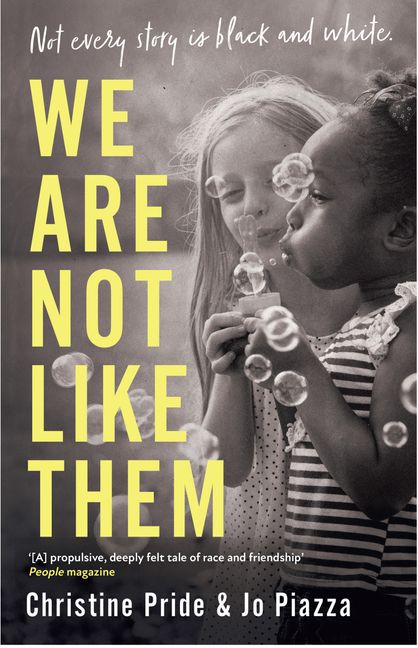WE ARE NOT LIKE THEM
Christine Pride & Jo Piazza
HarperCollins
REVIWED BY CUSHLA McKINNEY
Jenny Murphy and Riley Wilson have been best friends for their entire lives. The fact that Jen is white and Riley is black has never been an issue between them. Their lives may have diverged over the last 14 years, with Riley leaving Philadelphia while Jen has remained behind, marrying a police officer and becoming part of the closed circle of law-enforcement spouses, but they have continued to support one another from a distance. Now Riley has moved back to the city to work at the local TV station KXY, Jen is seven months pregnant and they are both looking forward to a joyful reunion.

But things fall apart when Jen’s husband Kevin is involved in the shooting of an unarmed African American boy, Justin Dwyer. As the only black reporter at KXY, Riley is given the lead on the story and, keenly aware that Justin could just as easily have been her own brother, focuses on the grieving family. Meanwhile Jen, forced out of her home by the media attention and threats of violence, watches helplessly as her husband is consumed by remorse and his fellow officers pressure him to deny responsibility. She cannot understand why Riley refuses to give Kevin’s side of the story, while Riley is equally amazed that Jen cannot see how inappropriate it is to even ask. This mutual breach of faith leaves both women facing significant challenges alone, separated by the one thing that they have never discussed: their race.
The novel arises from the collaboration between a black and a white author, one that recognises the solution is not colour-blindness but being willing to see and be seen. Not only does this lend distinctiveness and veracity to both voices at a time when issues of cultural appropriation and self/other-representation are being critically evaluated, it invites the reader to share in a dialogue between the writers themselves. As such it is often uncomfortable reading.
The blame is not one way, however, and Riley eventually accepts that her unwillingness to fully trust Jen has contributed to the division between them. Fearing that talking will make things worse rather than better, she has never told Jen how racism shapes every aspect of her existence lest her friend dismisses or disappoints her by failing to understand.
Although the conflicted relationship centres the novel, We Are Not Like Them has so much to say about cultural and institutional injustice that it threatens to collapse under the weight of its own talking points. Yet the very fact that such a book is necessary (resonating far beyond US shores) highlights just how easy it is for the privileged to tune out the voices of the vulnerable. As such, it is only fitting that the last word goes to Justin’s mother: “On a good day . . . she lets herself believe that people will do the right thing . . . [t]oday though, as another mother grieves, is not one of those days.”












